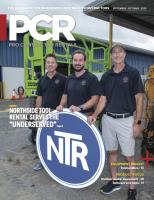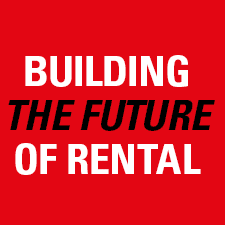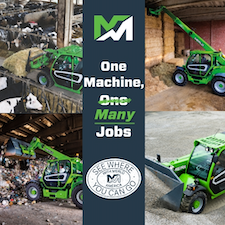Business Management: What is your employee development strategy?
Front-line training can improve customer satisfaction.
By Barry Himmel
The question I am hearing most often from leaders in the equipment rental industry focuses on employee development. With improving business and a reasonable amount of turnover, they have many new employees. In addition, they feel their tenured staff is becoming complacent.
I think we would all agree that employee development is a key part of a leader’s job. However, the reality is that many managers may not have the skills necessary to develop their teams. They fail to look at the big picture, which is: How will this employee contribute to the growth and success of the business in one year or five years? Managers also lose sight of the fact that the employee is a reflection of the manager and of the company.
We can also make a case that it is the organization’s responsibility to develop employees to their fullest potential. When that happens, everyone benefits; The company becomes stronger and more profitable, employees are happier and more content and customers receive better service. It also becomes a tool for identifying high-potential employees. It is win all around.
Where do you start your employee development strategy? One of the primary areas of focus needs to be the manager of the front-line employee. This would include branch, parts, or service managers. It could also be a function of other areas such as human resource or finance.
The challenge with these managers is they may have been promoted into the position because they were good on the front line or they have been with you for a while and management is the next step their career. That is fine as long as managers recognize their strengths and weaknesses. Just because an employee was good at processing parts orders or servicing equipment does not mean they have the skills required to lead and develop team members.
If they don’t have those skills, they need to be developed. Managers need to look at the wide range of leadership and coaching programs that are available. For example, at Signature, the coaching program focuses on situational development. Our staff helps identify and isolate a situation so a corrective action plan can be developed. Part of the methodology includes developing the plan with the employee and identifying a timeline for any change in behavior. While this may seem formal, it is actually a quick process that addresses specific situations.
Good managers should also emphasize coaching and reinforcing positive behavior so employees know their work is appreciated and recognized. Not all coaching has to be directed toward correction.
Each front-line employee needs a specific development
plan. New employees need a structured onboarding program that insures their new career will be off to a good start.
In the rental industry, much of the employee’s initial training is product- or operation-specific. It is more technical. There are several reasons for this. One is there is a lot of good information regarding the products you rent. Manufacturers know this is important and often regard this training as part of their support.
Front-line managers are typically more comfortable and experienced with technical and operational skills. That is what they know best and new employees are anxious to learn about the equipment.
However, there is an entire another side to employee development. These are customer experience skills. The skills that will help differentiate your rental company from other companies. These are the engagement skills such as tone, attitude and passion.
There are compelling reasons why devoting time to developing an exceptional customer experience makes sense. Here are just a few:
- According to the White House Office of Consumer Affairs, news of bad customer service reaches more than twice as many ears as praise for a good service experience.
- A study by American Express found that 7 in 10 Americans said they were willing to spend more with companies they believe provide excellent customer service.
- A Harris survey indicates that almost 9 out of 10 U.S. consumers say they would pay more to ensure a superior customer experience.
From the start, employees need to be aware of the impact they have on the customer experience. It needs to be part of your onboarding training strategy. Here are some suggestions:
- Make certain employees understand your company culture. This should be visible through your mission, vision and value statements. Be proud of your culture and refer to it often.
- Promote it from the top down. Include a message from senior leadership about the importance of building relationships, appreciating customers and delivering value in every interaction.
- Define standards for excellence so employees know what is expected of them. These standards can define your greeting, thanking your customers,
- appearance, body language and other customer-focused metrics.
- Set an example. Provide examples of great service further illustrating why it is so important to your company.
- Invest in training. These skills need to be taught and reinforced.
The reality is most employees are not receiving this level of development. Leaders often readily admit that they have not trained employees on these skills. They know it is a deficiency and it needs to be corrected. They feel they are missing a way to differentiate their rental location from their competitors.
A formal training program is key. It will bring the consistency that is so important to a rental center’s success and reputation. Managers must make sure everyone is on the same page. Regardless of which location or department with which they are working, customers should expect great service. It needs to be a way of life.
Consider companies that your business patronizes on a regular basis. Why are you a repeat customer? Is it because of their great service or value they provide? Is it consistency of the experience? They have performed reliably so your company has come to rely on them?
Your customers have those same considerations and employees need to understand how important they are in building loyalty and retaining customers.
Another way to look at employee training is to compare it with coaching a sports team. How much time and energy do coaches spend on player development? Sports teams practice regularly and monitor and measure progress and coach to improve. Why should business be any different? Hire the right people and continue to develop them.
Employee development needs to be ongoing. When there are changes to products or technology good managers quickly share those with employees. Managers should also make ongoing efforts to develop customer experience skills.
Make it fun and inspiring. It is an ongoing journey of developing a legendary team that results in happier employees, loyal customers and a stronger organization.
Barry Himmel is a senior vice president for Signature Worldwide, a Dublin, Ohio-based company offering a wide range of customized employee development programs for rental, equipment and other industries. For more information on Signature programs, visit www.signatureworldwide.com or contact him at barryhimmel@signatureworldwide.com.
Copyright 2018 Direct Business Media. All rights reserved.












